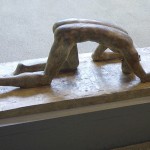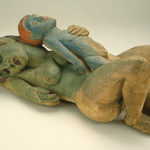Perhaps it was like this—
The drape of her dress on the kneeling board, hands crossed over her breast, in prayer or reading. Maybe asleep. She did not invite him in.
Of course she was terrified. Of course she jumped back and gripped the wall. Threw books at him. Said, “Don’t ask such things of me! To carry a child, unwed. To risk death by stoning.” And he, the difficult child, the unknown one. “No! Get out!”
Perhaps he left. Came back. The Angel Annunciate.
“Stop bothering me!” she might have said. Thinking, if I even listen to you, I will come undone. His light, his voice. As of another world. A world past sand and crow. Past the laundry drying in the tree.
learned to wait until she said, “Come in”
Why did I think it was an easy thing? A moment of terror and then consent. How could it be? Years, years to do that work. To look into an unknown world, past lake and market smell, the fish, their hammered heads, the thud, that sound of her father working, her mother grinding almonds between stone, just so, that flick of the water from her fingertips, that bit of oil. The paste. The angel leaving, coming again.
Perhaps he learned to make the sound of knocking, learned to wait until she said, “Come in,” before he let go his celestial light. His nimbus brighter than the sun. Perhaps he learned to stay on the far side of the room, hands at his sides. His wing against the wall. They eyed their differences. All that lay between. So that, in time, she came to mark the distance on the floor between where he always stood and where she sat. Forty inches and three quarters. A new, unchanging, sacred space. In time, coming to know the shadow on the floor, cast from his light, to be her own. Many times into her room. Perhaps seventy times seven.
Years, years, trying to see how she was separate from her friends, the water in the well, the raven, her mother’s hand, the dust on the stony ledge. Until she knew her own outline, how could she let another in? “Go! Get out of here!” And he, vacating through the wall. His trace, his feather, on the cold clay floor.
She put it in her basket with the others.
The first ones, when Gabriel was young and confident. Proud of his charge. Proud of his vocation. The cobalt blue, the radiating green of the wing. In those days, when his entrance lit up her room.
Now she barely notices when he is there. His grey wings, travel-worn and weary. The fatigue she sees in his eyes. His clumsiness. A jar knocked over by mistake. His wrinkled, callused feet. His tattered nimbus now a simple crown of fish.
Patient, the patient angel. His weathered wing. His mission not accomplished. His old age, his worry. Shame.
Among the angelic choir, silence when he passes by. The Crazy Angel, they call him, The One Who Doesn’t Give Up. Grey winged, blue eyed. The gentle one. He waits long. Returning. Leaving again. His life that is no longer remarkable. Frayed. Dull.
“I am ready. I have enough room.”
Did she have a violation? A memory? A wound? A cave inside big enough to hold the problem child? What wound could this be? Perhaps only when she remembered it, would there be room.
The day when her work was finished, long, since that first visit when she threw the books, she speaks to him. Knowing to speak louder than before. His diminished hearing, his eyes cloudy, the whites yellowed with age. “I have a ripped-apart place,” she tells him. “I am ready. I have enough room.”
He raises his tired eyes. He spreads his wings, wide, against the wall. His nimbus fills with light.
“Behold,” she instructed him. “See before you the handmaid of the Lord.”
Simone Martini [Public domain or Public domain], via Wikimedia Commons










































